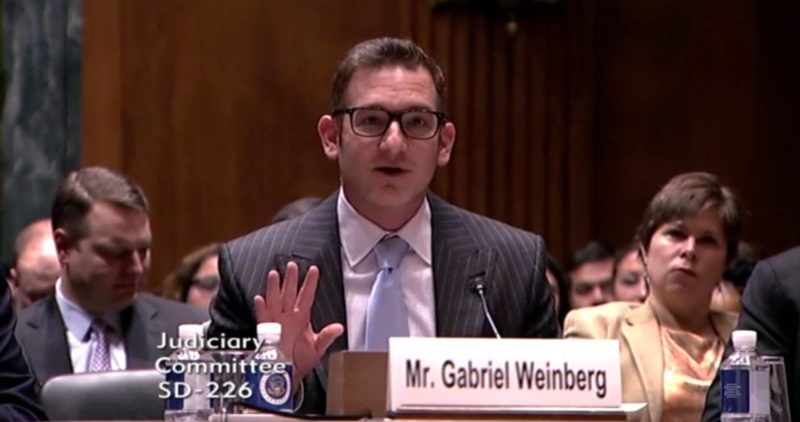DuckDuckGo CEO testifies: Privacy legislation isn’t ‘anti-advertising’
Gabriel Weinberg also believes that privacy legislation can make the internet more competitive.
DuckDuckGo Founder and CEO Gabriel Weinberg testified Tuesday morning before the Senate Judiciary Committee on online privacy. The committee was holding a hearing on GDPR, CCPA and potential U.S. privacy legislation.
Contextual targeting vs. behavioral advertising. In prepared remarks Weinberg argued that “privacy legislation is not anti-advertising” and cited DuckDuckGo as an example. The company serves old-school contextual search ads that don’t rely on personal data and don’t retarget consumers.
He said that the company has “been profitable using contextual advertising since 2014, and last year we earned substantially more than the $25 million revenue floor that subjects a company to CCPA.” Weinberg speculated that returning to contextual ads “would allow companies to remain profitable, or even become more profitable – all without the unintended consequences of behavioral advertising.”
Privacy good for business. Beyond this, Weinberg made the case that privacy is good for the bottom line: “Consumers flock to brands they trust and respect.” He said that DuckDuckGo had grown as consumers had become more privacy conscious.
Source: SurveyMonkey, n= 2,122 U.S. adults (3/19)
A recent poll of more than 2,000 U.S. adults conducted by online publication Axios found a clear majority believe that there need to be more consumer privacy protections.
Privacy legislation forcing competition. Weinberg made a third, very provocative point, which is that “well-drafted privacy legislation can spur more competition and innovation in one of the most foundational markets of the Internet: digital advertising.” He said consumers should be able to opt-out of online tracking — theoretically that’s true today — and that “monopoly platforms could be prohibited from combining data across their different business lines.”
Weinberg also recommended that any potential acquisitions “that strengthen existing data monopolies” be blocked.
Why you should care. The notion that privacy protections could be combined in the same legislation with rules to promote online competition is going to appeal to many in Washington. (Elisabeth Warren has made breaking up “big tech” part of her presidential platform.) Indeed, Weinberg’s testimony will likely be persuasive to many on the committee and in the gallery.
Whereas the outlook for federal privacy legislation was very dim at the beginning of the year, it appears to be gaining momentum in Congress and the media. However, it remains to be seen if these and other hearings translate into concrete legislation, which would then need to pass a very divided Congress.
Contributing authors are invited to create content for Search Engine Land and are chosen for their expertise and contribution to the search community. Our contributors work under the oversight of the editorial staff and contributions are checked for quality and relevance to our readers. The opinions they express are their own.
Related stories

